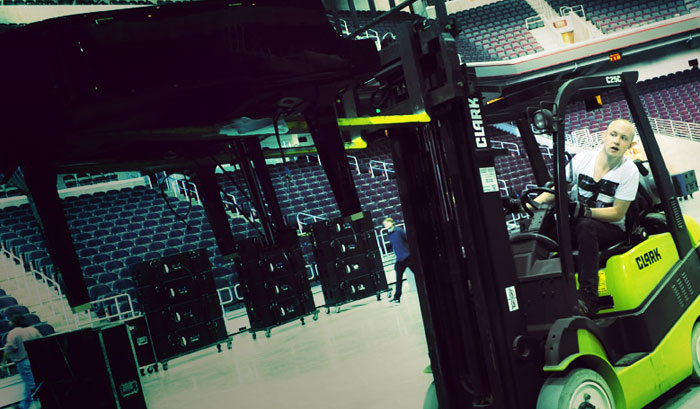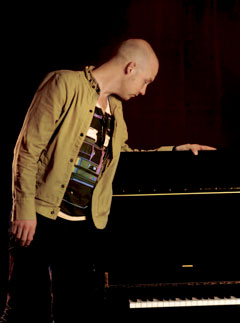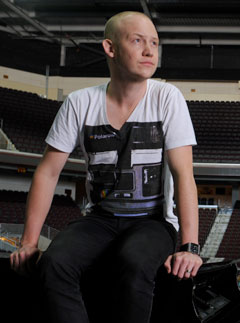


NOT MANY BANDS CAN DELIVER CONFESSIONAL, spiritual songs that still make enough noise to fill an arena. But since the Fray's double-platinum 2005 debut, How to Save a Life, which triggered four Top 40 hits and was the best-selling digital album of all time, the Denver-based group's confident and emotional alternative-pop sound has resonated nonstop through radios, MP3 players, theaters, and stadiums from Boston to Berlin.
"Playing live is the part I enjoy the most," says Isaac Slade, the band's frontman and piano player. "We get in front of real fans with no corporation between us, and we connect, people to people."
It's a good thing Slade loves to perform, since the band's current tour--supporting their second album, The Fray--will have run 18 months by the time it concludes next spring. We caught up with Isaac somewhere between Laramie, WY and Columbus, OH, a few weeks after the Fray wrapped up their second European tour of the year.
Yamaha are committed to making quality instruments, and I'll stick with them because they're winners.
How do you know when you've done your job well as a performer?
If you play the mental game of "crowd response equals success," then you just second-guess yourself all the time. And crowds are different in different cities, different countries. You can play the exact same show in Barcelona as you did in Portland, and grown, straight men scream at everything you do! But the coolest hipster teenage girl will just stare at you in Portland. You've just got to get up there and connect with the music. Remember why you wrote the song in the first place, and perform from that place, rather than the "gotta-sell-records" place. And usually it goes well.
What techniques have you come up with for building a great set list?
It's more of a trial-and-error thing. We have great ideas, we try them, and they fail. We have bad ideas, we try them, and they succeed. So we try to keep an open mind, to try everything at least once. Going from three quiet, old, obscure songs to one hit, back to another obscure song. Dynamically we change things up. I stand up sometimes, I sit down sometimes. We have big, blow-'em-up intros, and we have super-soft intros. You try everything.

The real challenge is to get outside your individual role and view the show as a complete experience. We had this guy named Bruce Ramos come in and address some of our ideas. He's basically a show designer--he worked with U2 for almost 20 years. When he talks, he's like, "Well, I don't know. I feel like the show wants to go in this direction." That really blew us away. We're used to defending our own ideas, but nobody in the band was used to defending the experience, the show itself. That mentality shifted everything. Our fans felt it, we felt it, and our friends and family who have seen dozens and dozens of shows felt it. Even our crew felt it. It had this incredible impact.
What are you most interested in saying with your songs?
I used to try to communicate something specific, but it was frustrating, because people wouldn't get it, and they would take away all these other insights. It felt like they were missing the point. Then I started paying attention to what I get out of the music I listen to--and ninety songs out of a hundred, I don't care what the guy meant it for, or what the woman was trying to say. I just apply my life to the song, and it becomes my soundtrack. I realized that it's sort of selfish to think people need to understand me perfectly. So I started to loosen up a little bit. On this last record, we approached the songs a little differently, thinking it's okay to have some ambiguity and flexibility. People come up and say, "Oh my gosh, it was our wedding song!" And I'm like, "What? It's about suicide! Okay, cool, it's your thing, have fun. Glad you're in love."
What first made you want to create music?
I was eight, and my mom somehow wrestled me into singing for this outdoor mall event our church was doing. So I went to this lady in our church's house, and she recorded three songs on a cassette player. My mom drove home, and I was singing along, and then she parked and I stayed inside the car practicing. I tried to sing louder, but it ended up just going higher, into this range I didn't know I had. I hated singing up to that point. So I was sitting in this minivan, and I discovered my voice. And immediately I wondered, "Do people do this for money? I wonder if it's something I can actually do as a job?"
And then running across people like Ray Charles. Guys that weren't perfect. Their voices were all dirty and messed up and scratchy, and I believed them more. My voice was kind of scratchy, and I didn't really know how to sing right. I really connected to that. Those old Joe Cocker records, and Randy Newman, and Tom Waits. All those guys, you believe they lived in the gutter, writing those songs.
You play a Clavinova CGP100 digital grand piano onstage, and a U1 acoustic upright in your dressing room. What led you to those pianos?
The Clavinova has been the best sound for us. It cuts through the drums without overpowering them. I play really low on the keyboard, and it doesn't step on the bass--or at least I don't think it does! I should ask my bass player. [Laughs.] But I think it fits in the pocket perfectly. I've tried a few other Yamahas, and some other brands, but it's just the one. I think it's set on medium touch--there are five different settings, and I've messed around with them all. You have to get into really high-end pianos to get a feel anywhere near the Clavinova. It's really impressive.

Then I write and practice a lot on my U1. It's the perfect standard-issue piano--standard in a good sense. Really consistent. We haul it around everywhere. We've beaten the crap out of it, and it's held up. It's like the Swiss Army Knife of pianos. We've also recorded with it, and it works great. It's got this great felt mute pedal for practicing--you push it down and it has a whole different sound. We've recorded with that, too. We love it.
Upright pianos tend to have a unique sound. What do you like about them?
Uprights have a lot more attitude. It's like the difference between a classical piano player and some kid that plays in the alley. On the upright, you hit a big C chord and it sounds like it's going to beat you up or something. You play the same thing on a grand, and it's this sort of formal necktie sound. That's the challenge with a grand, to make it sound informal. The upright comes across right away as an "Everyman" sound.
I record mostly on a grand--I recorded our first two singles, "How to Save a Life" and "Over My Head," on a Yamaha C7. But we're always challenging ourselves to make it sound a little more approachable. Actually on this third record we're starting to demo a lot of stuff out, and we haven't used the grand yet. We're trying to get away from it, to get a little less of the sweeping, epic sound.
What do you hope audiences respond to most in your music?
Different people connect to different things, but I want people to hear the story. I want people to connect with me as a storyteller. The piano, the drums, the guitar, the chords, the lights, and everything else contributes to the story, in my mind. Maybe the drummer would say differently. A lot of guys don't listen to lyrics, I've noticed. For some reason a lot of women do. But for me, it's all about that story.
And if there's no melody, or if there's a melody with a stupid lyric that doesn't have a story, or the story is so vague that it could be spouting random sentences from a dictionary, I just can't connect to that stuff. There's merit for pure instrumental music--for every genre, there's a Dave Brubeck that blows me away. But as a musician, the farther I get away from the storyline, the less I have to say, and the less I have to give. So whether we have two albums or twenty albums, I hope that people continue to connect with the stories that we're telling.
What's the best thing about being a musician?
I was thinking about that this morning, actually, getting on this plane, watching all these businessmen going to their jobs. I don't know their lives, but I'm assuming the worst, I suppose. I get to engage people with every part of myself. I get to engage them physically, standing up and using my voice and my body. I get to engage them spiritually, hopefully singing into the depths of who they are. I engage them emotionally with these lyrics, and my expression. I engage with them mentally and intellectually with all these different puzzles of life.
When I had a job making coffee, I got to engage people with maybe two of those things. I always felt frustrated that I couldn't go any deeper, because I was with these people for three minutes and that was it. And now I fall asleep exhausted, having engaged people with everything that I am, and given them everything that I have. I think that makes a job enjoyable. That makes a job worth working.
(Photography Credit: Rob Shanahan)
























